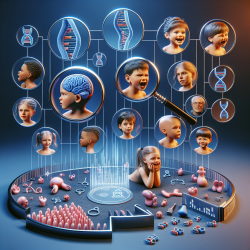As a practitioner working with children, understanding the nuances of emotion regulation is critical. Recent research titled (Not) getting what you want: frustration and emotion regulation in children with sex chromosome trisomies offers invaluable insights into the challenges faced by children with sex chromosome trisomies (SCT) and provides data-driven strategies to improve outcomes.
The study focused on 75 children with SCT and 81 controls, aged 1-7 years, during a frustration-inducing event. Findings revealed that while children with SCT showed similar physiological arousal compared to controls, they exhibited more emotion regulation difficulties. These difficulties were not attributable to differences in general intellectual functioning.
Here are some key takeaways for practitioners:
- Limited Behavioral Alternatives: Children with SCT displayed a more limited range of behavioral strategies and tended to rely on inefficient strategies longer as they aged.
- Importance of Early Intervention: Early identification of emotion regulation issues can guide the development of tailored interventions to mitigate long-term socio-emotional problems.
- Constructive Strategies: SCT children engaged less in constructive strategies, which are essential for goal-directed actions and support-seeking behavior.
Practitioners can leverage these findings to design more effective interventions. Consider incorporating emotion regulation training that focuses on:
- Modeling and Teaching: Use role-playing and interactive activities to demonstrate effective emotion regulation strategies.
- Parental Involvement: Educate parents on how to support their child's emotional development through consistent and positive interactions.
- Use of Technology: Utilize online therapy platforms like TinyEYE to provide accessible and consistent support for children with SCT.
For a deeper dive into the research and its implications, I encourage you to read the original research paper: (Not) getting what you want: frustration and emotion regulation in children with sex chromosome trisomies.










